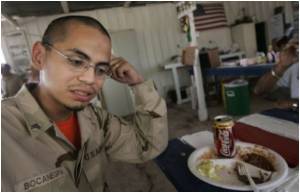Teenage survivors of a major earthquake experienced high levels of post-traumatic stress disorder (PTSD), with girls and older students being the most severely affected, according

They found that the biggest difference between the genders and age groups was due to increased emotional arousal, where people feel constantly on guard, have problems sleeping, are subject to outbursts of anger or irritability and find it hard to concentrate. The findings underline the need for young people to receive prompt psychological support after major disasters to avoid them developing long-term mental health problems.Nearly 70,000 people died in the 2008 earthquake, which measured 8.0 on the Richter scale, 375,000 were injured and 18,000 are still missing. More than 5,000 children and teenagers died.
"Earthquakes usually strike suddenly, without warning, affecting large populations and leaving injury, death and destruction in their wake" says lead author Dr Weiqing Zhang. "Some survivors develop PTSD, a severe and complex disorder characterised by persistent problems, including intrusive memories of the traumatic event, avoidance of stimuli associated with the trauma and a heightened emotional state."
The students who took part in the study had an average age of 15 years and four months, 54% were female and two-thirds were older students, aged 16 plus.
Key findings:
- The earthquake struck when the students were at school - 38% saw their classmates, friends or teachers die and three-quarters saw people injured. 12% of the boys and 7.5% of the girls were injured themselves.
- Fifty-five of the students' mothers and fathers died or went missing after the earthquake and a further 321 were injured.
- Half of the students stayed in the affected area during the aftermath and 90% of their families experienced severe property loss. Half of the students had group or individual counselling. Three-quarters received material support.
- The overall average score on the 17-item PCL-C scale, which is used to measure PTSD in civilians, was 33.64 out of 85 (range 17-85). Girls recorded higher scores than boys (34.20 versus 32.98) with senior students recording higher scores than junior students (34.21 versus 32.48). The same pattern was observed in the individual categories.
- Just over 60% displayed at least one symptom when it came to re-experiencing the event, with an average score of 9.86 out of 25 (range 5-25).
- A quarter displayed at least three symptoms when it came to avoiding reminders of the event and feeling numb, with an average score of 12.64 out of 35 (range 7-35).
- Just under half (49%) displayed at least two symptoms of increased emotional arousal, with an average score of 11.14 out of 25 (range 5-25).
- The study also showed that boys tended to cope by using problem solving, while girls focused on emotional release.
Advertisement
The authors have three key recommendations for clinical practice as a result of their study:
Advertisement
- Social support, including material support and psychological intervention, should be made available as soon as possible after the traumatic event.
- More attention should be paid to high-risk adolescents, including girls, older students, those most affected by the trauma - including loss of property, personal injury and the death of friends and family - and those who use passive coping skills to try and avoid the issues.
- Survivors should be encouraged to use effective coping skills to make themselves feel more in control. Cognitive behaviour therapy can also prove useful in some cases.
"Sadly, the world has been affected by a number of large-scale natural disasters in the last few years, including large earthquakes and tsunamis" says Dr Zhang. "Our research underlines the importance of making sure that adolescents receive the psychological support they need to rebuild their lives, as well as the practical resources they and their families need to rebuild their homes and communities."
Source-Eurekalert










